- Home
- Tony Roberts
Casca 38: The Continental Page 8
Casca 38: The Continental Read online
Page 8
Casca cursed the fog under his breath. It may be fine to hide the advancing troops but it was a bastard in concealing their objective. They were the lucky ones; they were following the Germantown Avenue, but the other columns would have to rely on good scouting, if they had it. Trees passed by to left and right, vague forms half seen, their branches prodding through the opaque blanket of white, as though they were reaching out to grab the men who were drifting underneath their canopies.
The air was full of tramping feet, clinking of buckles and squeaking of leather. The men’s breath added clouds of vapor to the fog; it was an unreal scene. Casca recalled a few incidents like this in his long past, but put them quickly out of his mind. That was then; this was now. A different battle, a potentially different outcome. You can plan everything down to the final detail but something could always come along to screw things up. A unit getting lost; a commander losing his nerve. Who knew what the coming fight would bring? It all added to the general feeling of uncertainty in Casca’s mind, and as far as he knew, of his fellow officers and men, too.
Casca moved on, alongside the column of men, heading for the sounds of muskets being discharged. Then the sound ceased and men glanced at one another. They picked up the pace, urged on by Colonel Greystock at the head of the column, and they marched on, again hearing shots from ahead.
Casca blew into his hands as he stepped out of the column again and surveyed the men. They were confident looking, eager to get some revenge for the loss at Brandywine Creek. Attacking the British in their camp was a good move. It’d ruin their breakfast.
His uniform had been replaced and now he had red facings and cuffs to his blue colored jacket and coat, white crossbelts and white leggings. The new clothes were welcome, especially as the colder weather would have cut through the threadbare uniform he’d worn out over the past year or so.
The day was fully upon them and some of the fog had lifted but enough remained to cloak the surroundings and conceal from them fully what was to either side. Of the other columns there were no signs apart from sporadic shooting to their left and up ahead.
They had just climbed up a short slight slope from a small bridge that crossed a tiny watercourse when the order to halt came. Up ahead could be seen a large rectangular two-storied brick and stone building, a house of some substance. Puffs of smoke were coming from the windows and it was clear that the British were in there holding out. “What’s that house?” Casca asked, nodding towards the solid looking construction.
“Chew House,” someone replied, “it’s a pretty big mansion house just outside Germantown. We live not too far away, sir.”
“Ah,” Casca said absently and watched as the senior officers conferred up ahead. Casca could see Washington speaking to the brigade commander and gesticulating to the house. “Looks like he wants us to clear them out of there.”
“Good – could do with some redcoat shootin’.”
Casca grinned weakly and squinted through the nebulous fog and mist at what was visible of the house at that distance. The abodes of the rich were solidly built and Chew House was no exception. The walls were straight and the entire construction rectangular with a black-tiled many-angled pitched roof. Both rows of windows were manned by musket-wielding redcoats and they were shooting at any passing American soldier.
The approach was along the road, which inclined gently, and undergrowth grew in plentiful clumps until about thirty yards from the house when suddenly there was no cover. Thirty yards of killing ground. Casca chewed thoughtfully on his lower lip. They’d have to get into the house fast or risk a large number of casualties.
Colonel Greystock came sauntering along the road towards them. Casca went up to him along with the other regimental officers. “General Washington wants that house taken. He thinks there’s a company of Brits holed up there, and we’re to see to it they’re eliminated. He doesn’t want them remaining as a threat to his rear.”
Casca nodded. If the main attack was beyond it, then it would be best to knock out any possible threat to their rear. The other risk was that in the fog any shooting from the rear could spread alarm and panic as the enemy could not be seen.
Cannon were wheeled up the road and Casca waved his men to follow the guns. “Find a place in the undergrowth and wait for orders,” he said, gripping his musket tightly. He knelt next to a thick alder and watched as the gunners prepared their pieces.
Shots came from the house, peppering the foliage and one man exclaimed suddenly and sank to his knees, holding his ribs. Apart from that single unlucky man, none of the shooting hit anyone. The guns spoke and Casca could see the round shot smashing into the stonework. One shot crashed into a window which blew inwards with a loud shattering sound, accompanied by cheers from the watching soldiers, all of whom were either lying in the grass or kneeling behind cover. Nobody wanted to be hit.
Another shot knocked the doors in, and they slowly collapsed inwards tiredly. More cheers came from the soldiers. Captain Soderling wriggled up to Casca. “Sir, think we’ll have to storm the place?”
“Aye, I think so, too. That house is taking the round shot without much trouble. You see any serious damage to the stonework?”
Soderling shook his head. “No, sir. Pity.”
“Pity indeed. We’ll get casualties. Make sure the surgeons are close.”
Soderling nodded and edged backwards. The clearing ahead was wreathed in smoke, and the sound of guns made Casca’s ears cringe. He slid away from the alder and made a quick round of the companies. Each officer knew what was expected of him. The trick was not to crowd the door as the very number of attackers could work against them. Casca detailed which units were to give covering fire and which one was to attack the doorway which stood open before them, pieces of furniture clearly standing there as an improvised barricade, including the now broken doors.
“It won’t be easy,” he told the men, “but press home the attack and with luck we’ll force our way in.”
“What about the rear, sir?” one of the men spoke up.
Casca was about to say he had no idea what was round the back when the man who’d spoken earlier, the one who lived locally, answered for him. “No door round there, bud. Just more windows with no doubt damned redcoats a-shootin’.”
Casca nodded. “One way in. One point of attack.”
If it had been a wooden construction or an inferior quality brick house then they might well have relied on the cannons to reduce it to rubble. Casca knew all too well just how hard it was to take a building, having been on both sides of that kind of fighting before. Constantinople, Vienna and the recent Prussian wars popped into his mind.
After thirty minutes or so the cannon fell silent. They had done their best but the sturdy stonework had held, even though pieces had been smashed off. The windows were nearly all broken and the doorway gaped invitingly at them. The smoke from the guns drifted away, and only the lingering fog now shrouded the house. It wouldn’t be the only thing for very long, for the assault was almost ready.
Casca slid forward and looked at the doorway, opposite him. He was going to do his damned hardest to take it, but the prospect of running thirty yards completely in the open with a dozen muskets blasting away at him gave him little comfort. Colonel Greystock had been given his orders and he in turn had passed them down to Casca and his fellow regimental commanders.
He got to his feet. He left his musket propped against the tree. He wouldn’t need it in the close quarters fighting they were going to be involved within a few moments. His saber was in his right hand and he waved his men to their feet. He almost felt the intent wash over him as they readied themselves, loading up and fixing bayonets. The other officers were holding their swords, too and stepping out in front of the rank and file.
“Company one, on my command. Companies two and three, keep those windows covered.” Casca waited until the shooting began from the cover of the trees and bushes, targeting the windows on the upper storey. Flakes of stone and w
indow fell, dislodged by the musket balls. He took a deep breath and stepped forward. “Advance!”
The men came at the house in a long line. Shadows of men appeared in the windows and at the doorway, bayoneted muskets leveled. Flashes of flame stabbed out and smoke billowed up from their discharges. A ball spat past Casca’s head and he heard it impact on someone behind him. The grunt told him one of his men was hurt. He ignored it and strode on, saber high. This was madness. More shots cracked out, striking down five more. The covering companies couldn’t hit the lower windows as they’d hit their own men.
“Take out those lower windows!” Casca snapped, seeing the British soldiers reloading. They were now close enough to make out individual features. The fog wasn’t as thick now that the day was progressing.
A group of men knelt and took deliberate aim. The crash of shots sent lead balls flying at the defenders, and men screamed inside the house. Casca felt a surge of adrenaline. “Come on, charge!”
They ran for the door. Two redcoats appeared, muzzles pointing evilly at him. Casca twisted to one side, away from the line of fire, and two shots rang out. One missed but the other took one of the men running for the door in the shoulder and he crashed to the ground untidily, arms out-flung, his musket clattering across the path that led to the stone steps below the door.
Casca sprang up the steps and saw the defenders massed in what must be the entrance hallway, reloading. A table and the broken doors had been pushed into the doorway. One of the soldiers brought his musket up and Casca grabbed the stock, pulling it forward. Surprised, the soldier lunged towards Casca and the eternal mercenary rammed his blade into the man’s chest.
The redcoat looked at Casca in shock and then slid backwards to the floor, dropping his gun. Casca now thrust his blade in at the defenders but they had taken a pace or two back and were now shooting through the doorway at the Americans who appeared there. Two more were sent pitching back into their comrades. Casca ducked as one shot almost hit him. Damn!
The crush at the door was immense. Men were crowded into a mass, trying to push in. The furniture hindered their progress and each shot from inside the large room seemed to hit someone. Casca spun round and stepped to the nearest window. Shots were being traded at a suicidal range and men were lying on the grass or crawling away slowly, clearly in pain. Another shot passed close and Casca winced. They were taking a hiding here in the open. He thrust his sword into the opening and the soldier looking to shoot out was almost skewered but he flung his musket up in time to deflect the blow.
Casca saw two men swing their aim to him and he threw himself back as their shots rent the air just over his head.
He got to his feet, cursing. Too many men had been hit. “Back! Back!”
The men staggered back from the doorway, leaving some of their number behind, and the shooting from the undergrowth increased now that none of their men were in the line of fire.
Casca threw himself down behind a tree and wiped his forehead. Lieutenant Connors crouched next to him. “Pretty bad, sir?”
“Madness. Your turn next. We’ll see what we can do to keep their heads down but there’s a large room down there full of redcoats. Their commander knows his stuff, whoever he is.”
Connors nodded and moved off, waving his men to get ready. Casca swore under his breath and waved those who had just got back to ready themselves to give covering fire. The next assault would need it.
He watched as Connors led the men across the corpse-dotted green, now splashed with red, to the bullet-riddled house and flung themselves at the doorway. Shots went in and more came out. Figures fell. Shots came from the men in the foliage, trying to keep the sharpshooters on the upper floor from shooting down, and he saw one redcoat clutch his face and topple backwards, his musket falling lazily like a leaf in autumn to the ground.
But the attack stalled and the men came floundering back, sweat-streaked and bloodied. Connors was one injured, blood masking one side of his face. Casca pulled him down and checked the wound. “Bullet grazed me,” the young man said thickly. He seemed dazed.
“Get him to the surgeon, now,” Casca ordered a nearby soldier.
Connors was led off, his legs clearly wobbly.
“Right, let’s go for it one more time,” Casca said, heaving himself up. “Follow me,” he waved the soldiers on. He ran across the green, crouched low, moving from side to side, trying to put whoever was aiming at him off. Two shots came close but he made it unscathed. Five men ran up the steps and hit the barricade with shoulders braced. The makeshift barrier shook but held. Shots came again and one of the men sank to his knees, face screwed up in agony, blood seeping onto his once clean white shirt. Casca thrust hard, his blade cutting down the arm of a soldier pushing with his musket at one of Casca’s men, and the soldier fell back with a cry of pain. His place was taken immediately by a British officer, saber falling from high towards Casca’s neck. He met it high. The two men pushed and strained across the table, free hands pressed on the once polished surface, but now chipped and cut beyond repair.
Shots blasted into the door frame and one struck Casca on the shoulder. He was sent spinning round and he staggered down the steps, half falling. He found himself on his hands and knees at the bottom of the entryway, his right shoulder on fire with pain. Gritting his teeth he got to his feet and lurched to one side, away from the men trying to push through the door.
More shots came from the windows and it was clear that the British weren’t going to give in easily. Captain Soderling came across, concern on his face. “Sir – you’re hurt!”
“Get them back, Captain, its suicide. We’re just collecting casualties.”
Soderling nodded and began urging the men back, arranging for those too badly wounded to be carried back. A few shots rattled out from the house and then they ceased, leaving the dead amongst the broken pieces of masonry.
Casca got to the safety of the trees and sank down onto his ass, screwing his face up in agony. A bullet wound wasn’t a laughing matter. He knew the ball was still lodged in his shoulder and it would need a surgeon to dig it out. That he would survive was absolutely certain, but he didn’t need the pain. A man digging round his flesh with metal instruments was bad enough, but his body would begin healing too damned fast for his liking – and for the surgeon’s – and questions would inevitably be asked.
Shit.
He clutched his bloodied uniform and looked up as shadows fell across him. Colonel Greystock and his aide-de-camp. “We tried, sir,” Casca gasped. “They’re too well ensconced in that house.”
Greystock tutted. “Very well, Major. Let the third try. Thank you for your efforts.” He turned and walked off towards the waiting 3rd regiment.
“You’re welcome,” Casca said sourly under his breath.
Soderling found him and knelt next to him. “You need to see someone about that wound, sir. The men are resting. We lost twenty dead and thirty-two wounded.”
“Too many, Captain. That house is too damned tough. They need to be burned out.”
“I doubt we’ve the time, sir. Shooting’s coming from our right. I think the British are reorganizing.”
“Then it’s a bust. Damn it!”
Soderling went off to check on the company and Casca gingerly made his way to the surgeon’s tent, a hastily erected canvas awning at the rear of the battlefield. Men were lying all round in the grass or on the roadside, some not moving, others groaning in obvious pain. Some uniformed men were kneeling by their sides, trying to ease their discomfort or just to talk to them.
Casca pushed past the wooden pole holding up the entrance and peered into the tent. A single blood-stained table stood there and a man in a red-soaked uniform looked up tiredly. “Ah, a major,” he said. “Shoulder wound? We’ll get that seen to straight away.” He waved Casca over to a wooden chair that was off to one side. He passed Casca a bottle. “Rum. A couple of mouthfuls to help dull the pain, then more for the wound to stop infection. Let’s get your j
acket off.”
Casca gritted his teeth against the pain and was relieved when he was finally divested of his jacket and shirt. The doctor looked at his torso. “Been in a knife fight?”
Casca grinned despite the pain. “Would you believe a bayonet attack?”
“No,” the surgeon replied, peering at the big scar down his chest. “That should have killed you alone. Want to tell me more?”
“No, doctor, I just want the bullet out.”
“As you wish – I doubt I’ve the time to listen to your story, anyway. Too many poor souls to see to.” He splashed the alcohol over the puckered hold and frowned. The hole wasn’t as red raw as others he’d seen that morning. No matter, it marked where the ball had gone. “Hold tight, about to dig around.”
Casca gripped the arms of the chair tightly and bit down onto a strap of leather the doctor thoughtfully provided to stop screaming. The pain was unbearable. Casca’s feet drummed into the wet ground as the probing went on, then he felt waves of nausea wash over him as suddenly his wound felt smaller and the sharp pain was gone, to be replaced by a deep throbbing. He opened his eyes to see a bloodied pair of pincers holding a ball the size of his thumbnail.
“There’s the devil,” the doctor said proudly, “now that wasn’t too bad, was it, Major? You made much less noise than many. I guess you’re used to pain?”
Casca nodded, spitting the leather strap out of his mouth. He couldn’t stop the saliva drooling down his chin and onto the ground; he was too much in pain to worry about such things at that moment.
“Like to have this as a souvenir?” the doctor held the ball close to his face.
Casca nodded; at least that would take care of the disposal of the blood soaked bullet. The doctor would wash his instrument clean of his blood so that would eliminate the problem of his blood poisoning someone else. He held out his hand and the bullet was dropped into it.
The doctor stuck a wad of cotton against the wound and began winding a bandage under his arm and over the top, binding the cotton wad to his shoulder. “I’ll let you go, Major. I’ve more work to do, you understand?” There were two more men standing in the entrance, one badly hurt, the other holding onto him.

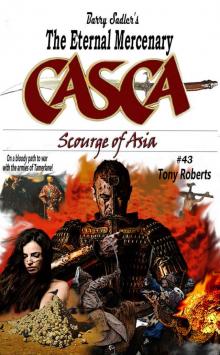 Casca 43: Scourge of Asia
Casca 43: Scourge of Asia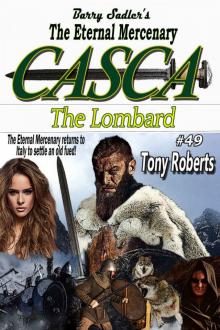 The Lombard
The Lombard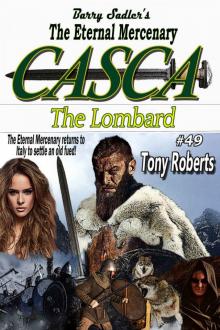 Casca 49: The Lombard
Casca 49: The Lombard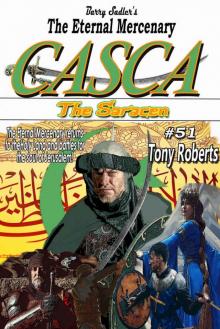 The Saracen
The Saracen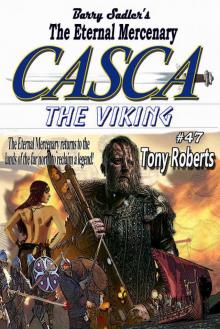 Casca 47: The Viking
Casca 47: The Viking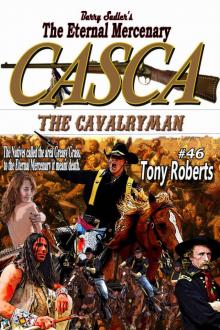 Casca 46: The Cavalryman
Casca 46: The Cavalryman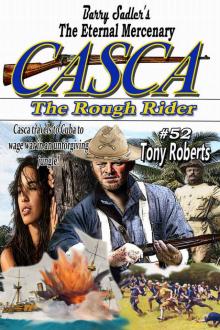 Casca 52- the Rough Rider
Casca 52- the Rough Rider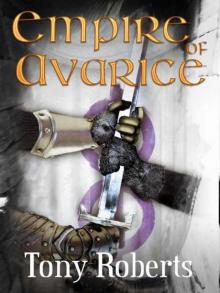 Empire of Avarice
Empire of Avarice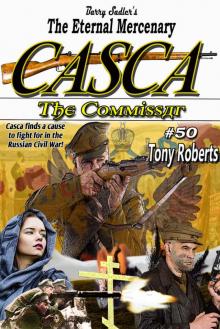 The Commissar
The Commissar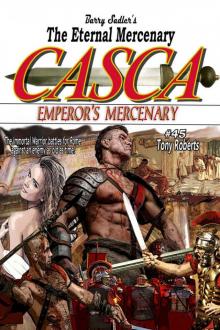 Casca 45: Emperor's Mercenary
Casca 45: Emperor's Mercenary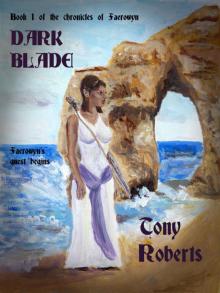 Dark Blade
Dark Blade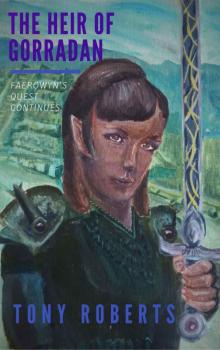 The Heir of Gorradan (Chronicles of Faerowyn Book 2)
The Heir of Gorradan (Chronicles of Faerowyn Book 2)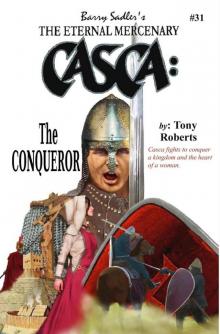 Casca 31: The Conqueror
Casca 31: The Conqueror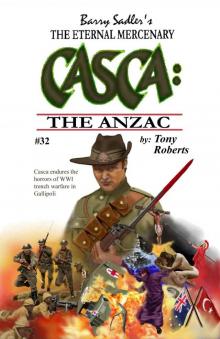 Casca 32: The Anzac
Casca 32: The Anzac The Anzac
The Anzac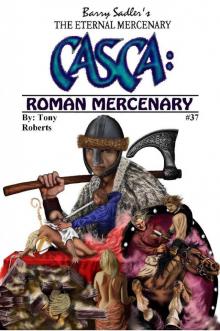 Casca 37: Roman Mercenary
Casca 37: Roman Mercenary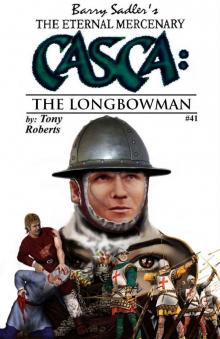 Casca 41: The Longbowman
Casca 41: The Longbowman The Longbowman
The Longbowman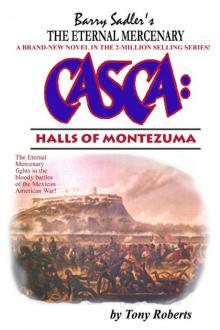 Casca 25: Halls of Montezuma
Casca 25: Halls of Montezuma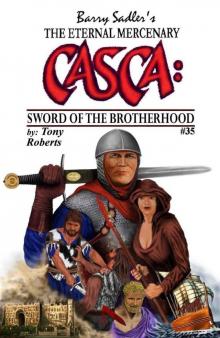 Sword of the Brotherhood
Sword of the Brotherhood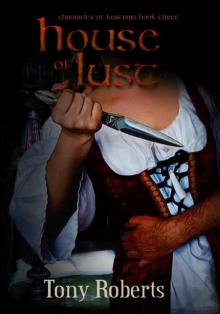 House of Lust
House of Lust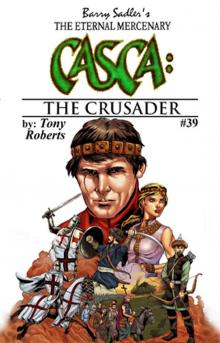 Casca 39 The Crusader
Casca 39 The Crusader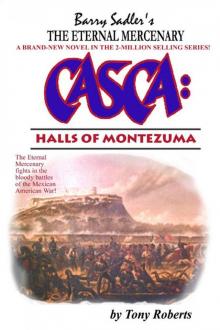 Halls of Montezuma
Halls of Montezuma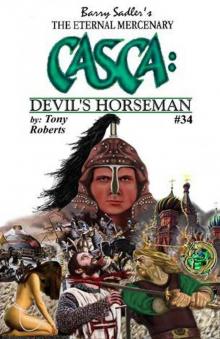 Devil's Horseman
Devil's Horseman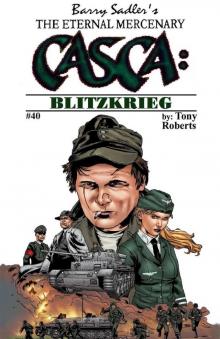 Casca 40: Blitzkrieg
Casca 40: Blitzkrieg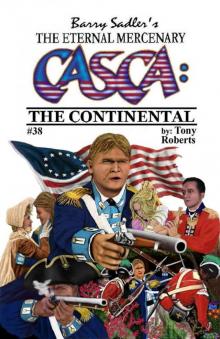 Casca 38: The Continental
Casca 38: The Continental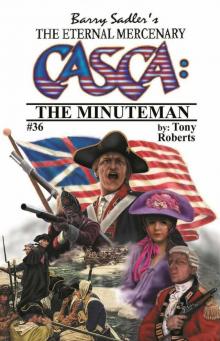 The Minuteman
The Minuteman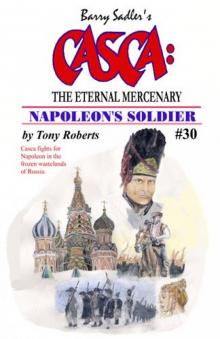 Napoleon's Soldier
Napoleon's Soldier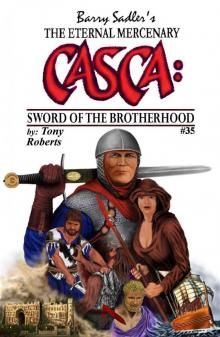 Casca 35: Sword of the Brotherhood
Casca 35: Sword of the Brotherhood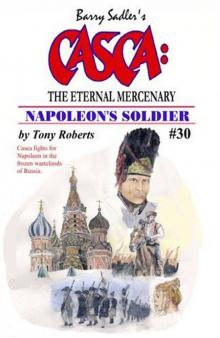 Casca 30: Napoleon's Soldier
Casca 30: Napoleon's Soldier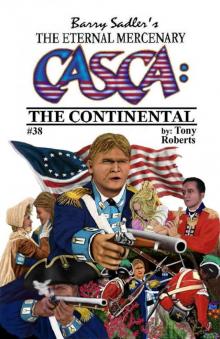 The Continental
The Continental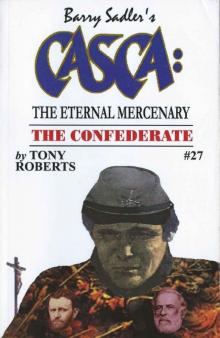 The Confederate
The Confederate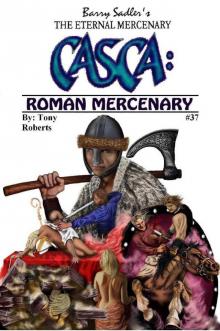 Roman Mercenary
Roman Mercenary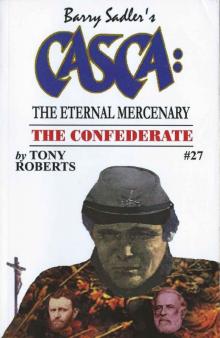 Casca 27: The Confederate
Casca 27: The Confederate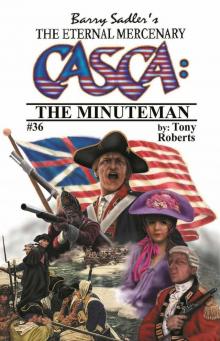 Casca 36: The Minuteman
Casca 36: The Minuteman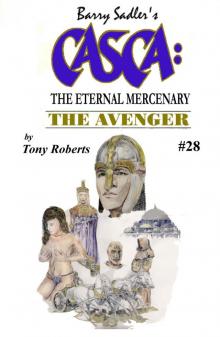 Casca 28: The Avenger
Casca 28: The Avenger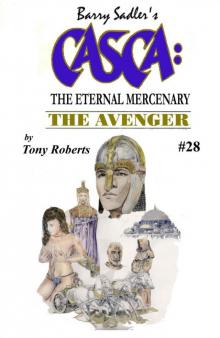 The Avenger
The Avenger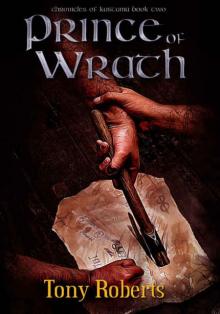 Prince of Wrath
Prince of Wrath